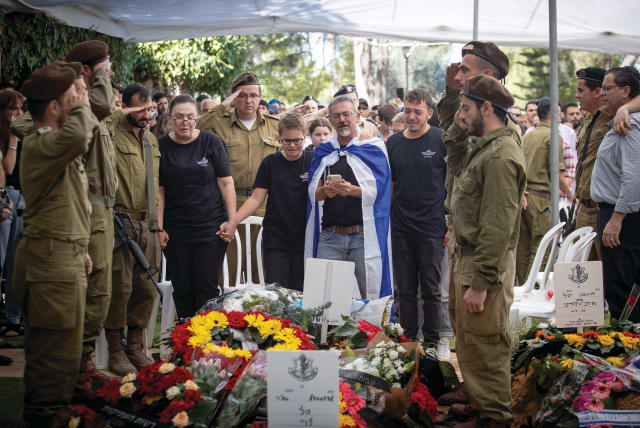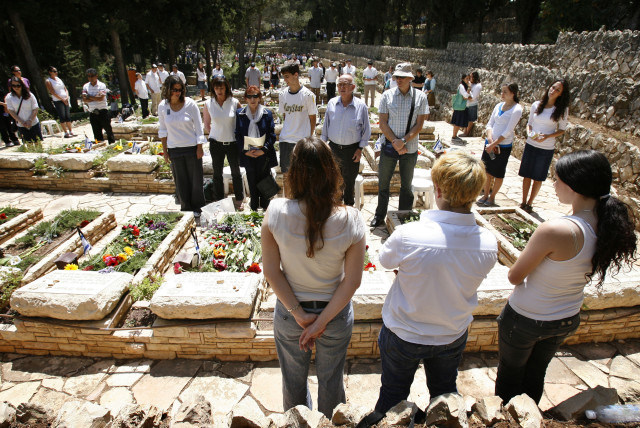All Jews must be there for the yizkor prayer after October 7 - opinion

Particularly this year, it’s crucial to ensure that the entire congregation is present for these commemorative prayers.
On the last festival day of Passover, Ashkenazi synagogues will be reciting Yizkor for the first time since the war began on October 7.
Many people, like myself, first began to hear about the Hamas attack in the midst of reciting Yizkor during that horrific Simchat Torah. For Ashkenazi Jews (Sephardim never adopted the Yizkor prayer), this Yizkor will be particularly poignant for those who lost loved ones in the war, who need our support.
We must also remember that Yizkor includes an element of communal mourning as we recite various El Malei Rahamim prayers for those who died on behalf of the Jewish people. Particularly this year, it’s crucial to ensure that the entire congregation is present for these commemorative prayers.
Who says the yizkor prayer?
Yizkor today is most noted as being an opportunity to remember personal losses. Yet it originated as a form of communal mourning after the 1096 crusades. Rhineland Jewry was attacked by Christian crusaders on their way to the Holy Land. They demanded that Jews convert to Christianity. Many who refused were murdered; some took their own lives rather than convert.
In the wake of this trauma, the Av Harahamim (“Father of Mercy”) prayer was written to beseech God to remember the martyrs and take vengeance on their murderers.
These martyrs were also memorialized in a communal book known as a Sefer Zikaron (“Book of Remembrance”). The list of names was introduced with the prayerful wish: “May God remember [Yizkor Elohim].” Alongside the martyrs, communal leaders or benefactors were listed. These names would then be read aloud in the community.
After the 1648-1649 Chmielnicki massacres in Poland and Ukraine, another prayer emerged, known as El Malei Rahamim (“God who is full of mercy”). Besides praying for the martyrs to enter the Garden of Eden, it includes the memorable line “We beseech the Merciful One to protect them under divine wings, and to bind their soul up in the bonds of life.” In the following years, the prayer was adjusted to apply to martyrs of other communities and victims from various calamities.
In more recent decades, variations of this prayer have been composed for Holocaust victims, as well as Israeli soldiers and citizens killed in war or in terror attacks. These are powerful prayers that represent our communal commemoration of those who died in the name of the Jewish people. Why wouldn’t everyone be present?
The problem emerges because the communal memorials are sung after individual Yizkor memorials are privately recited. Many worshipers are not back in the synagogue because most congregations instruct attendees who have never been required to sit shiva (because they have never lost a parent, sibling, child, or spouse) to walk out before the private Yizkor is recited.
As Zvi Ron has documented, the first record of this custom appears in a work published in 1815 by Rabbi Baruch Brandies. Brandies writes that he was asked whether this longstanding practice violates the biblical prohibition on following superstitions. He couldn’t find any recorded rationale for the practice. He suggested that perhaps there was a concern that everyone in the synagogue would feel compelled to say the prayer. Fearing that people whose parents were alive would errantly say these words, it was suggested they leave the room, lest their mistaken Yizkor prayer cause the death of their parents.
Other rabbis offered alternative explanations, such as that it would be inappropriate for synagogues to have some people praying while others remain silent. If you can’t pray with the congregation, then step outside. A couple of scholars speculated that children or others not reciting the prayer would talk or otherwise distract those reciting Yizkor.
In a different spirit, a few contended that it is generally inappropriate to participate in a mourning ritual on a joyful festival. But for those who have someone to remember, this commemorative ritual is comforting, thereby making it uplifting and appropriate for a holiday. Within this group, Yizkor makes sense on a holiday. For everyone else, however, it would be a forbidden expression of sadness.
Ultimately, a different 19th-century explanation for this practice has come to dominate Jewish lore: Simply remaining present in a room full of orphans will invoke the “evil eye” (ayin hara). A similar explanation noted that it is common for children to be named after the deceased forefathers whose names are being recited in the Yizkor prayers. Accordingly, it is considered “opening one’s mouth to Satan,” as the Sages put it, to mention names of the deceased in the presence of their living descendant with a similar name.
One can debate how much we should worry about such concerns. Some decisors noted that if people would have to walk out into a dirty or rainy place, they could simply remain within the synagogue and recite a memorial for deceased relatives (like grandparents). Similarly, many large yeshivot tell all people to remain for Yizkor, since having the majority of their young students leave would cause unnecessary disruption. Many rabbis, however, believe it is important to maintain this long-standing custom.
In any case, especially this year, it is crucial for people to return to synagogue in time for the communal El Malei Rahamim. An alternative solution is to recite the communal memorial first before people leave for the individual Yizkor.
My organization, Ematai, has produced a Hebrew-English version of the special El Malei Rahamim composed by the IDF chief cantor for those killed in this current war. One can download it from the Ematai website at ematai.org/war-yizkor.
The author is the executive director of Ematai and author of Ethics of Our Fighters: A Jewish View on War & Morality (Maggid).
Jerusalem Post Store
`; document.getElementById("linkPremium").innerHTML = cont; var divWithLink = document.getElementById("premium-link"); if (divWithLink !== null && divWithLink !== 'undefined') { divWithLink.style.border = "solid 1px #cb0f3e"; divWithLink.style.textAlign = "center"; divWithLink.style.marginBottom = "15px"; divWithLink.style.marginTop = "15px"; divWithLink.style.width = "100%"; divWithLink.style.backgroundColor = "#122952"; divWithLink.style.color = "#ffffff"; divWithLink.style.lineHeight = "1.5"; } } (function (v, i) { });

